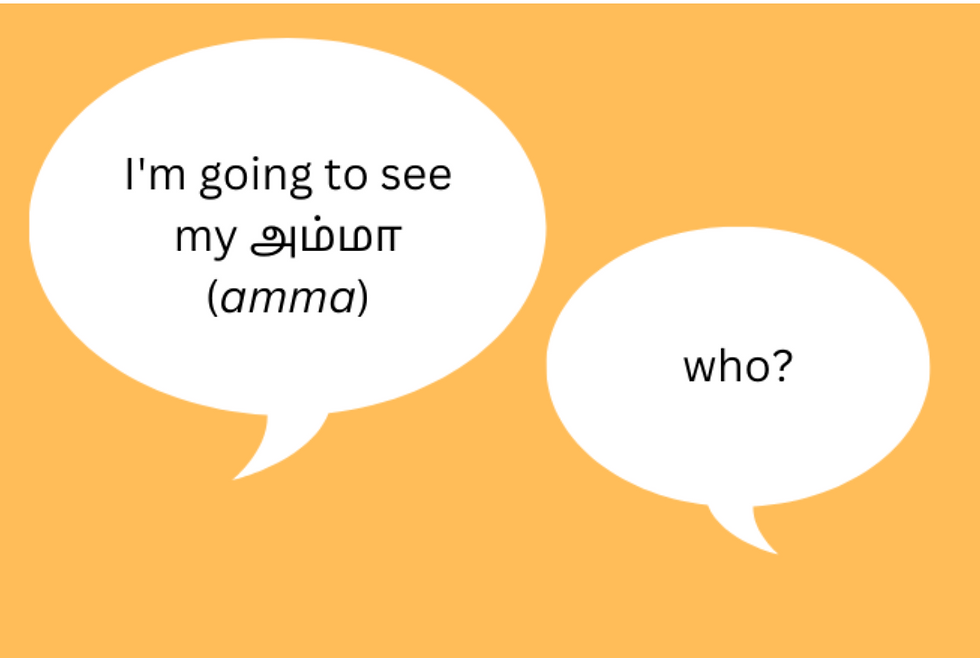Ancestral Tamil Beliefs Embedded in Language: Insights from Greetings and Death Expressions
- What You Missed In Tamil Class

- Sep 21, 2025
- 3 min read
Updated: Oct 28, 2025
Examining how Tamil language preserves and transmits ancestral worldviews
Language is more than a medium of communication.
It is an archive of cultural knowledge, values, and philosophies. From grammatical structures to everyday phrases, language encodes the ways in which communities understand and interpret the world.
The Tamil language is no different, and it offers a particularly rich site for exploring such ancestral beliefs.
As a Tamil Canadian, my effort to understand the philosophies and values practiced by my ancestors initially led me to examine the intentions behind daily practices and festivals.
Over time, I came to realize that these practices cannot be understood in isolation. Rather, they reflect a broader worldview in which underlying values and philosophical perspectives consistently shape cultural life. Heritage, in this sense, cannot be reduced to singular events or customs. It lives within all aspects of how a group of people live - including their daily speech.
This short article explores how ancestral Tamil beliefs and philosophies are reflected in linguistic expressions. By examining Tamil greetings, farewells, and phrases surrounding death, we'll uncover a worldview in which human life is continuous, deeply connected to nature, and extends beyond the physical body.
Greeting
When meeting or departing, it is customary to say the word வணக்கம் (vanakkam) with both palms placed together at the heart. This word is often translated simply as “hello” or “greetings,” which misses its depth and positioning in how Tamils viewed human interaction.
Tamil words can often be analyzed by splitting their components to reveal deeper meanings. Here, I propose வணக்கம் (vanakkam) could derive from வணங்கு (vanangu), meaning “to worship, offer respect, or pray,” and அகம் (akam), meaning “the inner world, unseen depths, feelings, emotions, or connection to source.” Taken together, வணக்கம் (vanakkam) signifies acknowledging and offering respect to another’s inner self or soul.
Hence, the very first word used when greeting another person encodes the recognition that there is something beyond the physical body – an inner essence that deserves acknowledgment. This understanding opens the door to many profound questions about identity, and how ancient Tamils interpreted human interactions, and the relationship with the physical body.
Departing
Although வணக்கம் (vanakkam) can also be used when departing, the common everyday (or spoken Tamil) phrase is போயிட்டு வாறேன் (poyittu varen), which literally means “I will go and come back.” This farewell expresses an understanding of continuity in relationships – that separation is never final, and connection persists.
Interestingly, to say simply போறேன் (poren), “I am going,” is socially unacceptable. Within cultural understanding, this phrasing is associated with death – leaving permanently, as in departing from this world.
It seems Tamil linguistic practice carefully distinguishes between temporary absence and ultimate departure, reflecting a worldview deeply attuned to continuity and mortality.
Death Expressions
Now what about permanent departure (death)?
In Tamil, death is traditionally expressed through phrases such as இயற்கை எய்தினார் (iyarkai eytinar), meaning “they have attained nature,” or காலமானார் (kalam anar), meaning “they have become time.” These expressions frame death not as an end but as transformation.
To “attain nature” or “become time” suggests that human existence ultimately merges with something larger, dissolving the boundary between individual life and perhaps the universe.
These linguistic metaphors seem to embody an ancestral belief that life and death are inseparable from the rhythms of time and the cycles of nature. They show the human being not merely as an isolated entity but as part of a continuous process.
Conclusion
Taken together, these expressions suggest that ancestral Tamil society possessed and transmitted a shared spiritual philosophy: that human life is continuous, larger than the physical body, and ultimately inseparable from nature and time itself. In examining these linguistic expressions, perhaps what modern societies often treat as esoteric spirituality was, for ancient Tamils, common knowledge woven into the fabric of daily speech and a fundamental principle of heritage.
This recognition opens space for further interpretation and reevaluation – not only of other Tamil expressions but also of the Tamil way of life. If such profound philosophies are embedded in everyday language, they must also have informed social organization, cultural practices, and broader understandings of existence in Tamil society.
Today most Tamil classes skip over the philosophies embedded in the language itself.
But when you understand the Tamil worldview woven into the grammar and language, everything clicks differently. It's no longer just learning words or rules, it's understanding why Tamil works the way it does.
That's exactly what we explore in Spoken Tamil Essentials, a beginner Tamil course that teaches you the foundation of the language and the wisdom behind it.
Start your Tamil speaking journey with a strong foundation.
Registration now open for January 2026. Only 6 spots per session.











Comments